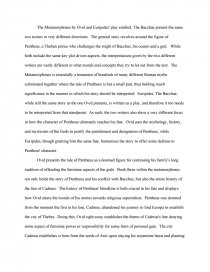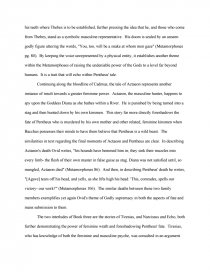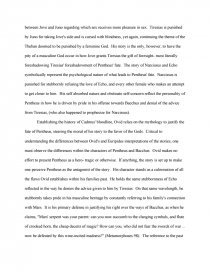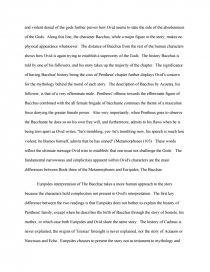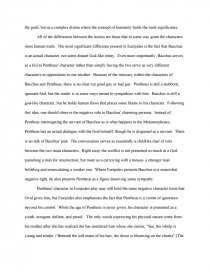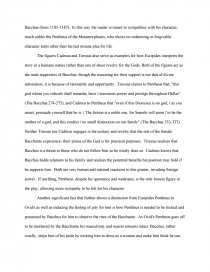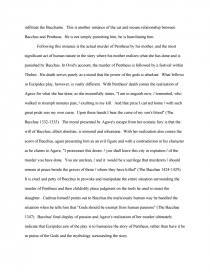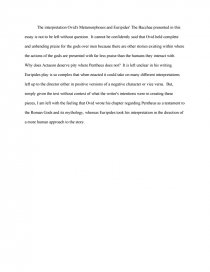Euripides and Bacchus
Essay by review • February 28, 2011 • Research Paper • 2,725 Words (11 Pages) • 1,948 Views
The Metamorphoses by Ovid and Euripides' play entitled, The Bacchae present the same two stories in very different directions. The general story revolves around the figure of Pentheus, a Theban prince who challenges the might of Bacchus, his cousin and a god. While both include the same key plot driven aspects, the interpretations given by the two different writers are vastly different in what morals and concepts they try to let out from the text. The Metamorphoses is essentially a testament of hundreds of many different Roman myths culminated together where the tale of Pentheus is but a small part, thus holding much significance in the manner in which his story should be interpreted. Euripides, The Bacchae, while still the same story as the one Ovid presents, is written as a play, and therefore it too needs to be interpreted from that standpoint. As such, the two writers also show a very different focus in how the character of Pentheus ultimately reaches his fate. Ovid uses the mythology, history, and mysticism of the Gods to justify the punishment and denigration of Pentheus, while Euripides, though granting him the same fate, humanizes the story to offer some defense to Pentheus' character.
Ovid presents the tale of Pentheus as a doomed figure for continuing his family's long tradition of offending the feminine aspects of the gods. Book three within the metamorphoses not only holds the story of Pentheus and his conflict with Bacchus, but also the entire history of the line of Cadmus. The history of Pentheus' bloodline is both crucial to his fate and displays how Ovid steers the morals of his stories towards religious superstition. Pentheus was doomed from the moment the first in his line, Cadmus, abandoned his journey to find Europa to establish the city of Thebes. Doing this, Ovid right away establishes the theme of Cadmus's line denying some aspect of feminine power or responsibility for some form of personal gain. The city Cadmus establishes is born from the seeds of Ares upon slaying his serpentine beast and planting his teeth where Thebes is to be established, further pressing the idea that he, and those who come from Thebes, stand as a symbolic masculine representative. His doom is sealed by an unseen godly figure uttering the words, "You, too, will be a snake at whom men gaze" (Metamorphoses pg. 80). By keeping the voice unrepresented by a physical entity, it establishes another theme within the Metamorphoses of raising the undeniable power of the Gods to a level far beyond humans. It is a trait that will echo within Pentheus' tale.
Continuing along the bloodline of Cadmus, the tale of Actaeon represents another instance of insult towards a greater feminine power. Actaeon, the masculine hunter, happens to spy upon the Goddess Diana as she bathes within a River. He is punished by being turned into a stag and then hunted down by his own kinsmen. This story far more directly foreshadows the fate of Pentheus who is murdered by his own mother and other related, feminine kinsmen when Bacchus possesses their minds to have them believe that Pentheus is a wild beast. The similarities in text regarding the final moments of Actaeon and Pentheus are clear. In describing Actaeon's death Ovid writes, "his hounds have hemmed him in; they sink their muzzles into every limb- the flesh of their own master in false guise as stag. Diana was not satisfied until, so mangled, Actaeon died" (Metamorphoses 86). And then, in describing Pentheus' death he writes, "[Agave] tears off his head, and yells, as she lifts high his head: 'This, comrades, spells our victory- our work!'" (Metamorphoses 106). The similar deaths between these two family members exemplifies yet again Ovid's theme of Godly supremacy in both the aspects of fate and mans submission to them.
The two interludes of Book three are the stories of Tiresias, and Narcissus and Echo, both further demonstrating the power of feminine wrath and foreshadowing Pentheus' fate. Tiresias, who has knowledge of both the feminine and masculine psyche, was consulted in an argument between Jove and Juno regarding which sex receives more pleasure in sex. Tiresias is punished by Juno for taking Jove's side and is cursed with blindness, yet again, continuing the theme of the Theban doomed to be punished by a feminine God. His story is the only, however, to have the pity of a masculine God occur in how Jove grants Tiresias the gift of foresight- most literally foreshadowing Tiresias' foreshadowment of Pentheus' fate. The story of Narcissus and Echo symbolically represent the psychological nature of what leads to Pentheus' fate. Narcissus is punished for stubbornly refusing the love of Echo, and every other female who makes an attempt to get closer to him. His self absorbed nature and obstinate self-concern reflect the personality of Pentheus in how he is driven by pride in his offense towards Bacchus and denial of the advice from Tiresias, (who also happened to prophesize for Narcissus).
Establishing the history of Cadmus' bloodline, Ovid relies on the mythology to justify the fate of Pentheus, steering the moral of his story to the favor of the Gods. Critical to understanding the differences between Ovid's and Euripides interpretations of the stories, one must observe the differences within the characters of Pentheus and Bacchus. Ovid makes no effort to present Pentheus as a hero- tragic or otherwise. If anything, the story is set up to make one perceive Pentheus as the antagonist of the story. His character stands as a culmination of all the flaws Ovid establishes within his families past. He holds the same stubbornness of Echo reflected in the way he denies the advice given to him by Tiresias. On that same wavelength, he stubbornly takes pride in his masculine heritage by constantly referring to his family's connection with Mars. It is his primary defense in justifying his right over the ways of Bacchus, as when he claims, "Mars' serpent was your parent: can you now succumb to the clanging cymbals, and flute of crooked horn, the cheap deceits of magic? How can you, who did not fear the swords of war ... now be defeated by this wine-incited madness?" (Metamorphoses 98). The reference to the past and violent denial of the gods further proves how Ovid seems to take the side of the absoluteness of the Gods. Along this line, the character Bacchus, while a major figure in the story, makes no physical appearance whatsoever. The distance of Bacchus from the rest of the human characters shows how Ovid is again trying to establish a superiority of the Gods. The history Bacchus is told by one of his followers, and his story takes up the majority of the chapter. The significance of having Bacchus' history being the crux of Pentheus'
...
...
